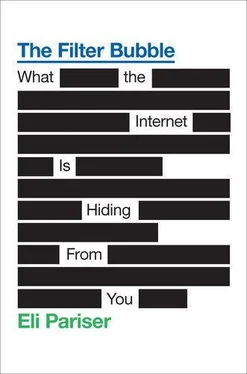Facebook was hardly the first social network: As Zuckerberg was hacking together his creation in the wee hours of the morning, a hairy, music-driven site named MySpace was soaring; before MySpace, Friendster had for a brief moment captured the attention of the technorati. But the Web site Zuckerberg had in mind was different. It wouldn’t be a coy dating site, like Friendster. And unlike MySpace, which encouraged people to connect whether they knew each other or not, Facebook was about taking advantage of existing real-world social connections. Compared to its predecessors, Facebook was stripped down: the emphasis was on information, not flashy graphics or a cultural vibe. “We’re a utility,” Zuckerberg said later. Facebook was less like a nightclub than a phone company, a neutral platform for communication and collaboration.
Even in its first incarnation, the site grew like wildfire. After Facebook expanded to a few select Ivy League campuses, Zuckerberg’s inbox was flooded with requests from students on other campuses, begging him to turn on Facebook for them. By May of 2005, the site was up and running at over eight hundred colleges. But it was the development of the News Feed the following September that pushed Facebook into another league.
On Friendster and MySpace, to find out what your friends were up to, you had to visit their pages. The News Feed algorithm pulled all of these updates out of Facebook’s massive database and placed them in one place, up front, right when you logged in. Overnight, Facebook had turned itself from a network of connected Web pages into a personalized newspaper featuring (and created by) your friends. It’s hard to imagine a purer source of relevance.
And it was a gusher. In 2006, Facebook users posted literally billions of updates—philosophical quotes, tidbits about who they were dating, what was for breakfast. Zuckerberg and his team egged them on: The more data users handed over to the company, the better their experience could be and the more they’d keep coming back. Early on, they’d added the ability to upload photos, and now Facebook had the largest photo collection in the world. They encouraged users to post links from other Web sites, and millions were submitted. By 2007, Zuckerberg bragged, “We’re actually producing more news in a single day for our 19 million users than any other media outlet has in its entire existence.”
At first, the News Feed showed nearly everything your friends did on the site. But as the volume of posts and friends increased, the Feed became unreadable and unmanageable. Even if you had only a hundred friends, it was too much to read.
Facebook’s solution was EdgeRank, the algorithm that powers the default page on the site, the Top News Feed. EdgeRank ranks every interaction on the site. The math is complicated, but the basic idea is pretty simple, and it rests on three factors. The first is affinity: The friendlier you are with someone—as determined by the amount of time you spend interacting and checking out his or her profile—the more likely it is that Facebook will show you that person’s updates. The second is the relative weight of that type of content: Relationship status updates, for example, are weighted very highly; everybody likes to know who’s dating whom. (Many outsiders suspect that the weight, too, is personalized: Different people care about different kinds of content.) The third is time: Recently posted items are weighted over older ones.
EdgeRank demonstrates the paradox at the core of the race for relevancy. To provide relevance, personalization algorithms need data. But the more data there is, the more sophisticated the filters must become to organize it. It’s a never-ending cycle.
By 2009, Facebook had hit the 300 million user mark and was growing by 10 million people per month. Zuckerberg, at twenty-five, was a paper billionaire. But the company had bigger ambitions. What the News Feed had done for social information, Zuckerberg wanted to do for all information. Though he never said it, the goal was clear: Leveraging the social graph and the masses of information Facebook’s users had provided, Zuckerberg wanted to put Facebook’s news algorithm engine at the center of the web.
Even so, it was a surprise when, on April 21, 2010, readers loaded the Washington Post homepage and discovered that their friends were on it. In a prominent box in the upper right corner—the place where any editor will tell you the eye lands first—was a feature titled Network News. Each person who visited saw a different set of links in the box—the Washington Post links their friends had shared on Facebook. The Post was letting Facebook edit its most valuable online asset: its front page. The New York Times soon followed suit.
The new feature was one piece of a much bigger rollout, which Facebook called “Facebook Everywhere” and announced at its annual conference, f8 (“fate”). Ever since Steve Jobs sold the Apple by calling it “insanely great,” a measure of grandiosity has been part of the Silicon Valley tradition. But when Zuckerberg walked onto the stage on April 21, 2010, his words seemed plausible. “This is the most transformative thing we’ve ever done for the web,” he announced.
The aim of Facebook Everywhere was simple: make the whole Web “social” and bring Facebook-style personalization to millions of sites that currently lack it. Want to know what music your Facebook friends are listening to? Pandora would now tell you. Want to know what restaurants your friends like? Yelp now had the answer. News sites from the Huffington Post to the Washington Post were now personalized.
Facebook made it possible to press the Like button on any item on the Web. In the first twenty-four hours of the new service, there were 1 billion Likes—and all of that data flowed back into Facebook’s servers. Bret Taylor, Facebook’s platform lead, announced that users were sharing 25 billion items a month. Google, once the undisputed leader in the push for relevance, seemed worried about the rival a few miles down the road.
The two giants are now in hand-to-hand combat: Facebook poaches key executives from Google; Google’s hard at work constructing social software like Facebook. But it’s not totally obvious why the two new-media monoliths should be at war. Google, after all, is built around answering questions; Facebook’s core mission is to help people connect with their friends.
But both businesses’ bottom lines depend on the same thing: targeted, highly relevant advertising. The contextual advertisements Google places next to search results and on Web pages are its only significant source of profits. And while Facebook’s finances are private, insiders have made clear that advertising is at the core of the company’s revenue model. Google and Facebook have different starting points and different strategies—one starts with the relationships among pieces of information, while the other starts with the relationships among people—but ultimately, they’re competing for the same advertising dollars.
From the point of view of the online advertiser, the question is simple. Which company can deliver the most return on a dollar spent? And this is where relevance comes back into the equation. The masses of data Facebook and Google accumulate have two uses. For users, the data provides a key to providing personally relevant news and results. For advertisers, the data is the key to finding likely buyers. The company that has the most data and can put it to the best use gets the advertising dollars.
Which brings us to lock-in. Lock-in is the point at which users are so invested in their technology that even if competitors might offer better services, it’s not worth making the switch. If you’re a Facebook member, think about what it’d take to get you to switch to another social networking site—even if the site had vastly greater features. It’d probably take a lot—re-creating your whole profile, uploading all of those pictures, and laboriously entering your friends’ names would be extremely tedious. You’re pretty locked in. Likewise, Gmail, Gchat, Google Voice, Google Docs, and a host of other products are part of an orchestrated campaign for Google lock-in. The fight between Google and Facebook hinges on which can achieve lock-in for the most users.
Читать дальше











